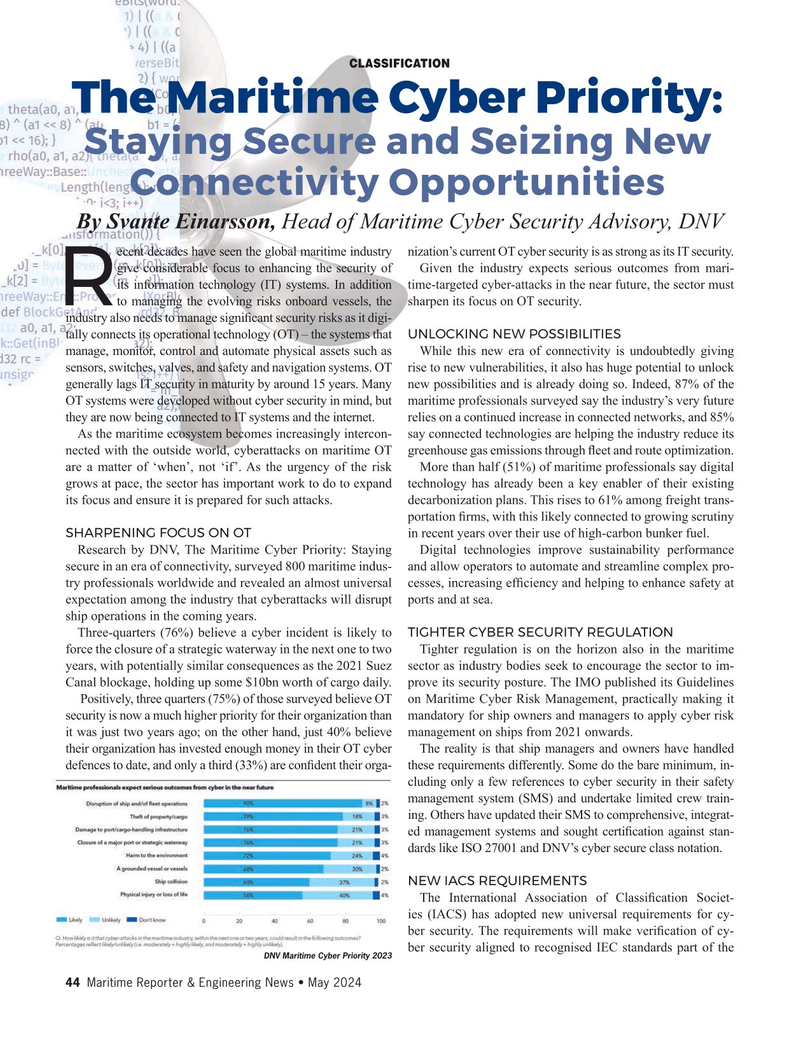
Page 44: of Maritime Reporter Magazine (May 2024)
Read this page in Pdf, Flash or Html5 edition of May 2024 Maritime Reporter Magazine
CLASSIFICATION
The Maritime Cyber Priority:
Staying Secure and Seizing New
Connectivity Opportunities
By Svante Einarsson, Head of Maritime Cyber Security Advisory, DNV ecent decades have seen the global maritime industry nization’s current OT cyber security is as strong as its IT security.
give considerable focus to enhancing the security of Given the industry expects serious outcomes from mari- its information technology (IT) systems. In addition time-targeted cyber-attacks in the near future, the sector must
Rto managing the evolving risks onboard vessels, the sharpen its focus on OT security.
industry also needs to manage signi? cant security risks as it digi- tally connects its operational technology (OT) – the systems that UNLOCKING NEW POSSIBILITIES manage, monitor, control and automate physical assets such as While this new era of connectivity is undoubtedly giving sensors, switches, valves, and safety and navigation systems. OT rise to new vulnerabilities, it also has huge potential to unlock generally lags IT security in maturity by around 15 years. Many new possibilities and is already doing so. Indeed, 87% of the
OT systems were developed without cyber security in mind, but maritime professionals surveyed say the industry’s very future they are now being connected to IT systems and the internet. relies on a continued increase in connected networks, and 85%
As the maritime ecosystem becomes increasingly intercon- say connected technologies are helping the industry reduce its nected with the outside world, cyberattacks on maritime OT greenhouse gas emissions through ? eet and route optimization.
are a matter of ‘when’, not ‘if’. As the urgency of the risk More than half (51%) of maritime professionals say digital grows at pace, the sector has important work to do to expand technology has already been a key enabler of their existing its focus and ensure it is prepared for such attacks. decarbonization plans. This rises to 61% among freight trans- portation ? rms, with this likely connected to growing scrutiny
SHARPENING FOCUS ON OT in recent years over their use of high-carbon bunker fuel.
Research by DNV, The Maritime Cyber Priority: Staying Digital technologies improve sustainability performance secure in an era of connectivity, surveyed 800 maritime indus- and allow operators to automate and streamline complex pro- try professionals worldwide and revealed an almost universal cesses, increasing ef? ciency and helping to enhance safety at expectation among the industry that cyberattacks will disrupt ports and at sea.
ship operations in the coming years.
Three-quarters (76%) believe a cyber incident is likely to TIGHTER CYBER SECURITY REGULATION force the closure of a strategic waterway in the next one to two Tighter regulation is on the horizon also in the maritime years, with potentially similar consequences as the 2021 Suez sector as industry bodies seek to encourage the sector to im-
Canal blockage, holding up some $10bn worth of cargo daily. prove its security posture. The IMO published its Guidelines Positively, three quarters (75%) of those surveyed believe OT on Maritime Cyber Risk Management, practically making it security is now a much higher priority for their organization than mandatory for ship owners and managers to apply cyber risk it was just two years ago; on the other hand, just 40% believe management on ships from 2021 onwards. their organization has invested enough money in their OT cyber The reality is that ship managers and owners have handled defences to date, and only a third (33%) are con? dent their orga- these requirements differently. Some do the bare minimum, in- cluding only a few references to cyber security in their safety management system (SMS) and undertake limited crew train- ing. Others have updated their SMS to comprehensive, integrat- ed management systems and sought certi? cation against stan- dards like ISO 27001 and DNV’s cyber secure class notation.
NEW IACS REQUIREMENTS
The International Association of Classi? cation Societ- ies (IACS) has adopted new universal requirements for cy- ber security. The requirements will make veri? cation of cy- ber security aligned to recognised IEC standards part of the
DNV Maritime Cyber Priority 2023 44 Maritime Reporter & Engineering News • May 2024
MR #5 (34-49).indd 44 5/3/2024 9:00:10 AM

 43
43

 45
45
